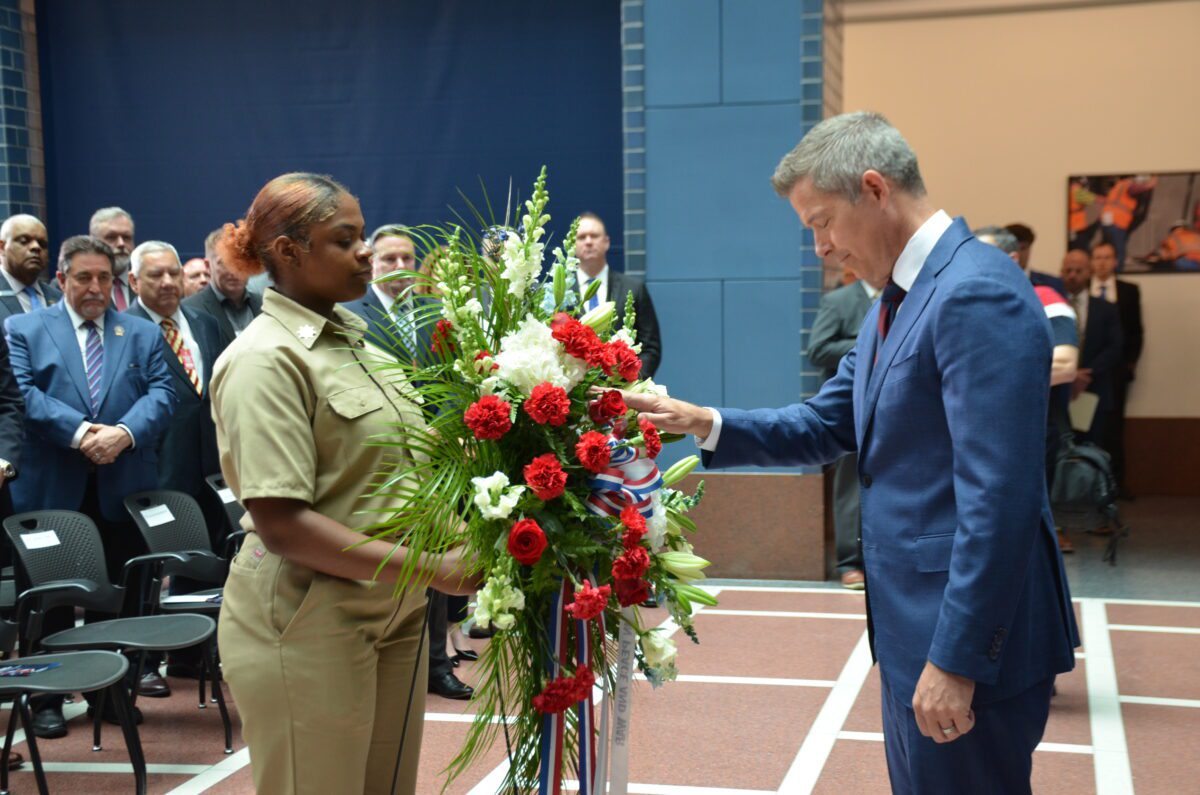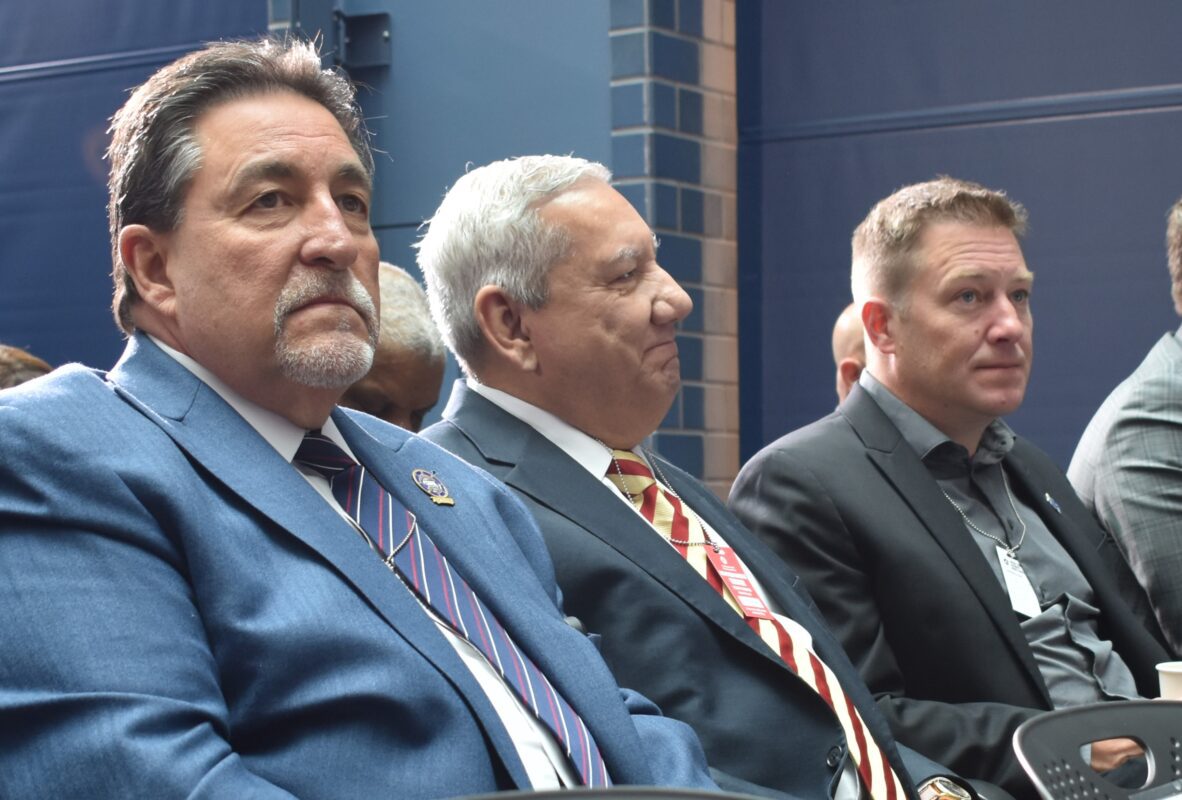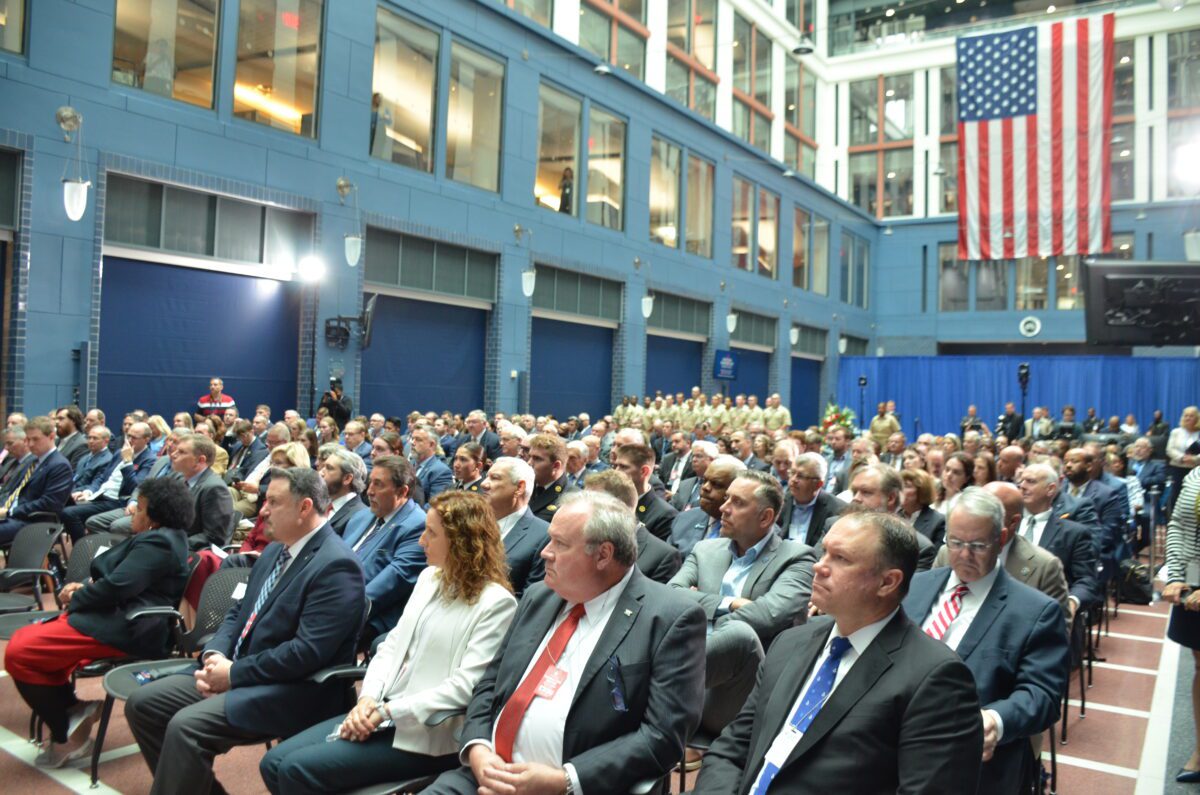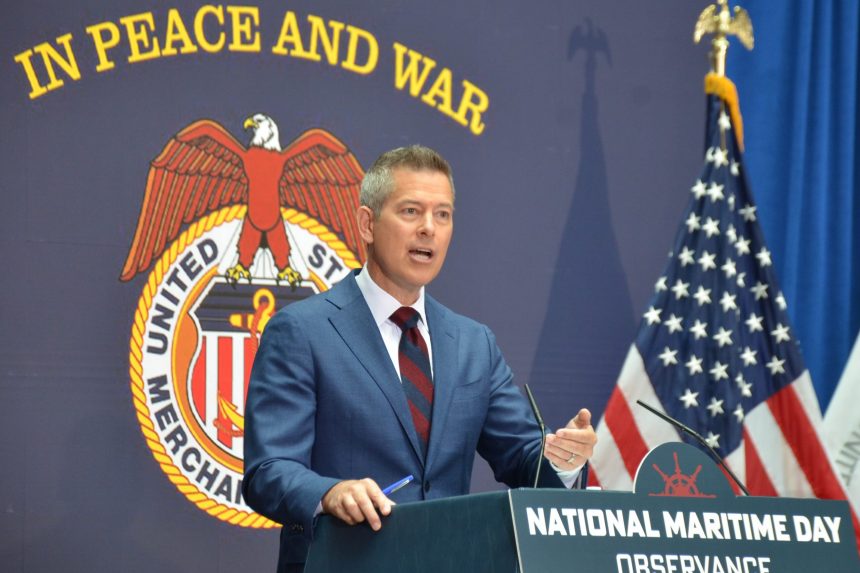DOT Ceremony Honors Past Service, Emphasizes Need for Revitalization

Along with appreciative acknowledgements for the U.S. Merchant Marine’s centuries of reliable service, speakers at this year’s National Maritime Day ceremony hosted at U.S. Department of Transportation (DOT) headquarters on May 22 emphasized the importance of living up to the event’s theme: Restoring America’s Maritime Dominance.
Weighing in with their unwavering backing of American maritime were Transportation Secretary Sean Duffy, U.S. Transportation Command Deputy Commander LTG Jered P. Helwig, and Interlake Steamship Company President Mark Barker.
Eighteen apprentices from the SIU-affiliated Paul Hall Center for Maritime Training and Education (PHC) attended the gathering in Washington, D.C., including Joseph Prather, who served as the ceremonial bell toller, and Shandria McClain, the memorial wreath bearer.

MTD officials in attendance included President David Heindel, Secretary-Treasurer Britanie Potter and Executive Board members Augie Tellez (SIU) and Adam Vokac (MEBA).
World War II mariner James Quinn (a former NMU member) and Vietnam mariner Joseph Cox received awards during the event. (Cox worked for decades in shoreside positions supporting the industry, including many years at the Department of Labor and at the Chamber of Shipping of America, respectively.)
Duffy noted that a recent pro-maritime executive order from the White House aims “to fortify maritime infrastructure, including upgrades to our ports, our waterways, to our shipping lanes. It’s an investment that’s going to be made to help secure our overseas markets for the products that we produce in America. We want to have access to those foreign markets, and it’s important that we have a maritime industry that can support American manufacturers.”
He said the order also is “going to boost domestic ship production for both commercial and domestic vessels. It’s going to expand the [manpower pool] of mariners to effectively command this new American armada, safeguarding the freedom that we have on our seas…. America has never won a war without our merchant mariners. We haven’t won a war without being able to build ships.”
The secretary recounted the U.S. Merchant Marine’s World War II heroism, including that of the more than 6,700 mariners who lost their lives sailing in support of the Allies. He pointed out that more than 800 U.S. merchant ships were sunk or damaged during the war, and that hundreds of mariners were detained as POWs.
Duffy then turned to current challenges facing the industry. He contrasted America’s recent shipbuilding output and its commercial fleet with those of China – a vital topic that has helped generate strong bipartisan support for revitalizing U.S. maritime.
“We used to be the (maritime) powerhouse,” Duffy said. “We used to be the best, and we’ve let this industry peter out and taper off, and we let some of our adversaries take the lead. If you want to be a global superpower, you actually have to build ships in your country, and you have to be able to sail those ships with your mariners.”

He then pledged that the government “is going to fix the problems. We’re going to make the investments; we’re going to offer the support to make sure that we stand up an industry that’s incredibly important for American security and American defense…. We can do this, but it’s going to be all of us partnering together and working together to make that happen.”
Helwig said he appreciated that his trip to the nation’s capital gave him “the opportunity to participate with not just the Department of Defense, but the Department of Transportation and our industry partners and (address) so many things that are vital to our national interests.”
The deputy commander thanked “our nation’s extraordinary merchant mariners…. We gather to recognize their invaluable contributions and the critical sealift capability that they provide. We honor the civilian mariners who crew the ships that carry the lifeblood of our economy and the strength of our military, and we celebrate the men and women of the U.S. Merchant Marine who bravely navigate the open seas, often in very perilous conditions, transporting vital goods, supplies and equipment across the globe.”
He echoed Duffy’s appreciation for the U.S. Merchant Marine of World War II (more than 250,000 mariners sailed during the war).
“This time-honored legacy fills us with immense pride and deserves our unwavering remembrance and as we honor the past,” Helwig stated. “I’m equally excited about the future…. Merchant mariners remain the cornerstone of global trade, ensuring the seamless flow of goods between nations and fueling the economic engine. Sealift must continue to be the bedrock of transporting large quantities of equipment and supplies by sea. It must remain the logistical foundation that enables us to project power globally and sustain operations for extended periods of time. While the other modes of transportation, like airlift, provide speed and other options, they all face the limitations of cargo size and weight, and so sealift provides heavy-lift capacity and capability essential for moving the things that the DOD needs to move most, such as armored vehicles, tanks, artillery and other bulky equipment that’s critical for combat operations.”
He continued, “This capability empowers us to respond effectively to crises worldwide. We must continue to navigate the future by investing in it, by innovating and by sustaining a ready and capable workforce to meet the evolving requirements. USTRANSCOM relies on the combination of government-owned and commercially operated ships to meet these sealift demands. To power these ships, we require strong crews of American merchant mariners. It’s great to see our future (the PHC Apprentices) standing behind us here as well.”
He concluded, “Let us honor the sacrifices of the mariners who have served our nation so faithfully over the years, and let us commit to supporting the policies and programs that will ensure that the U.S. remains a maritime power for generations to come.”
Barker described his company’s history and touched on World War II-era shipbuilding and vessel operations, then said, “Today, our fleet is smaller, more domestic than international, but it has the same spirit and dedication as when we played the larger part in the economic prosperity and ensured a critical lifeline for our troops and our allies. The U.S.-flag Jones Act operators are ready to answer the call, given the opportunity. The Jones Act is critical for our national and economic security. We are not the lowest-cost provider, nor should we be. We build our ships under the highest safety and environmental standards. We pay good wages and benefits to the incredible women and men who build and operate these ships. We cannot compete, nor should we try to compete against ships that are built through foreign subsidies by countries that do not hold safety, people, the environment or good wages as a priority.”
Referring to the executive order, along with recently reintroduced maritime legislation and planned steps by the U.S. Trade Representative, he encouraged U.S. maritime industry allies to “grab hold of this momentum. We need to execute this strategy for the long term to ensure that our maritime industry not only stays strong, but also builds to ensure our country’s economic and national security.”

